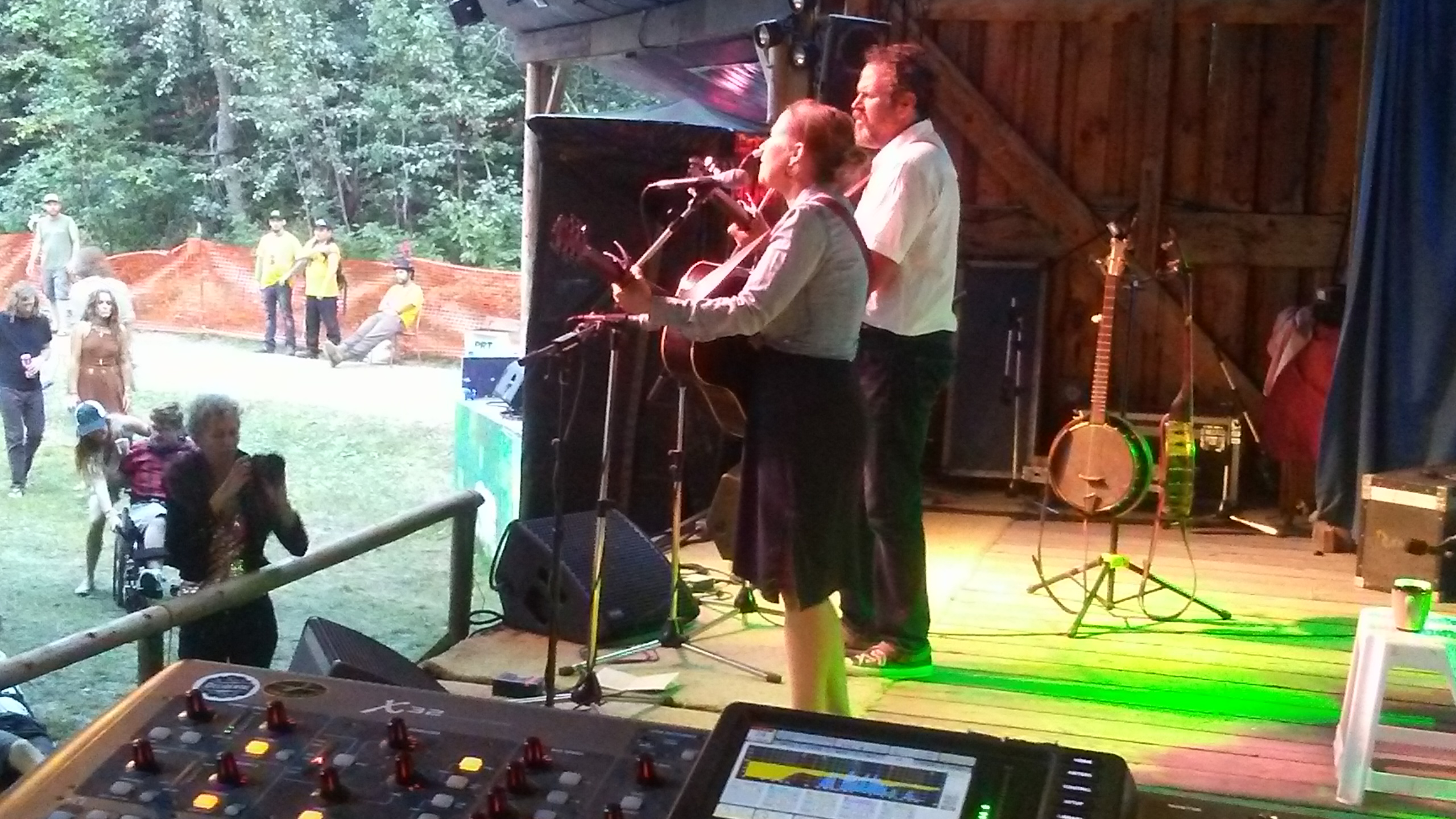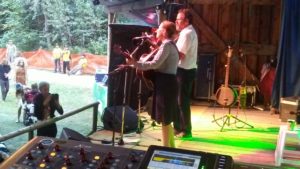
After all, aren’t we all artists anyway?
What does it mean to you when you mix the music that isn’t yours?
 The highway is cold in October in northern British Columbia. The winds whip and the grey skies chill bones. The only warmth I could find was from within, my stubborn little heart working overdrive being overwhelmed with passion, determination, fear, and excitement. Within moments I would be arriving in Edmonton in pursuit of sound people to hopefully learn from, and I had no idea what I was in for.
The highway is cold in October in northern British Columbia. The winds whip and the grey skies chill bones. The only warmth I could find was from within, my stubborn little heart working overdrive being overwhelmed with passion, determination, fear, and excitement. Within moments I would be arriving in Edmonton in pursuit of sound people to hopefully learn from, and I had no idea what I was in for.
I hadn’t been to E-town in a long time, and most of my friends had moved on from there. I knew I must have been lucky because this really amazing group of musicians took me in with welcoming arms, and let me tell you, they are true musicians. Each one so immensely talented, all excelling quickly and about to gain national attention. So many of the people I spent time with have since won rather impressive awards and show little sign of slowing down! I didn’t know it at the time, but this trip was to be a lovely journey into the mind and hearts of those that make the music I have since learned (and love) to mix.
The more time I spend with musicians and actors, the more I somehow simultaneously love and hate the way in which we treat them, on set or onstage. It seems to me like they are treated as though they are children, full of naivety, bound for error, and full of mischief. We create the simplest paths through our terrain, so their need for decision-making is as low as possible. We carry them into specific areas and put up protective walls to shield them from stress, noise, conflict, or concern. And we smile big, holding doors and offering libations. We hide the technical from them as though it’s none of their concern and we take on the hard jobs so that they need not worry about it. It annoys me to no end when I watch crew members who misunderstand this relationship dynamic. The act of over-bestowing personal space, flattery, pleasantries, attention, and doting, big smiles, loud small talk, etc. can be perceived as being fake, which in turn resembles a lack of respect. New stage workers see this and assume they aren’t to be respected. However, when approached earnestly the intricacies of these relationships are rather interesting, resembling that of the yin and yang energetic dance.
We learn quite quickly in this field of work that we cannot do it alone, not a single one of us can. It takes a team, all with unique skills and qualities, and all working our respective roles in unison. So the act of sheltering artists is also kind of considerate and thoughtful, rather than it being rude or demeaning. Depending on how you look at it, the gesture could say, “I don’t believe you can fully understand all the components at play here.” Or it can say, “I respect your role. I recognize your art as a crucial component of our collective puzzle. Keeping you sheltered from the hijinx, drama and technical issues is my way of offering you the best space I can, to allow you a minimal stressed environment so that you may best be able to share your art on our stage.” And there are miles of difference between the two.
In Edmonton, I slept on floors and couches, jammed by fires, studied sound through online universities, practiced scales in parks, secretly listened to rehearsals, went to show after show (“studying”), and even got flung over the shoulder of none other but C.R. Avery himself during his set! He continued, marching around with my feet in the air as he finished his number in the dim-lit Aviary, where he was offering up to us his theatrical and outlaw-ish musical poetry. I was in the thick of musical expression and artistic pursuits. Late nights, later mornings, so many pints, so many cigarettes. We were all just stories sitting on wooden bar stools, flocked by the liquor with open eyes and ears. I witnessed torn clothes and spilled beers, strong winds and psychedelic revelations of strangers. I witnessed awards and aggression, heartaches and heartbreaks, and even found myself so unguarded that I experienced my own as well. The trip became a real ‘trip’ that’s for sure! And it all came full circle when I was lucky to meet two SoundGirls who offered me what they could, and sent me on my way. I have been lucky enough to cross paths since with one at ArtsWells in 2017. She was mixing the main outdoor stage, and I was volunteering and mixing the casino (Jack’s), as well as the small outdoor Bears Paw. We met under the stars one evening and talked compression in the streets until our friends wondered where we were. I felt so proud to be able to demonstrate to her how far I had come, and even prouder when she wasn’t surprised. The other woman I have not seen since. She taught me how to festival patch, wrap cables over-under, and I can still hear her voice constantly asking me about my signal flow. A few hours out of her day and it made a lasting and meaningful impact on my life. Education sharing without restraint is essentially investing in the quality of future techs which benefits all of us, and it above all it benefits the music.
I ended up leaving this oil town in an army truck with wheels taller than my head. And when I rode out and down that highway, I wondered when I would be back, and if I would lose the music that had begun to tingle through my fingertips. I looked on, kept forward, and puttered back south to Vancouver as the engine rumbled and spat. I was offered my first ever gig mixing at Woodstove Festival in the north of Vancouver Island. It is a festival organized by musicians. The event was about run for its first year, and I was invited to take part! I was to mix in the main hall, and I had never touched a board!
No one was concerned about that, however, and of course, I was terrified and praying for a miracle. But these people, these bluegrass island folk human jems saw something in me that they wanted to bet on, something I hadn’t even yet identified for myself.
You see, we must remember that these artists that we sometimes treat so cavalier, they speak, they witness, they also can see the magic that we often debate is even there, and they share stories of those moments with others. When you take the time to approach them and their art with grace and care, they see you, they mention you, they sing your praises, and they recommend you for jobs and tours. I have so much more to learn on technical skill still today, but damn did I ever make a name for myself in this community quickly when I respected the delicate space of art creation. Just as I prayed on my long road back south, I am still just hoping that I can do right by them, and live up to it.
 Janna Dickinson aka JDog broke into the industry last year when she accidentally worked nine festivals! At the Last-ival, having worked every volunteer role through to stage-managing, she watched the techs and realized that she had finally found a job where her varied skill sets could finally all work in unison. She spent nearly two months couch hopping while hitching to every tech across BC that she had met at festivals which were willing to teach her anything. Her first gig was waiting for her when she returned! With a childhood free from live music, she had never played in a band or plugged in an electric guitar. She was learning it all from scratch! So, learning WHAT an XLR cable is called, let alone what it’s for! She returned to the same festivals this year with a new role and received honorable mentions at each one. Follow her on her journey of navigating such a complex industry as a complete novice, working solely on instinct, an ear and the drive to work at her passion no matter the odds. Unafraid to ask embarrassing questions on her quest for excellence, she carries with her goals of touring, teching/tuning, tv, and teaching. Her freelance company is Penny Lane Audio & Production.
Janna Dickinson aka JDog broke into the industry last year when she accidentally worked nine festivals! At the Last-ival, having worked every volunteer role through to stage-managing, she watched the techs and realized that she had finally found a job where her varied skill sets could finally all work in unison. She spent nearly two months couch hopping while hitching to every tech across BC that she had met at festivals which were willing to teach her anything. Her first gig was waiting for her when she returned! With a childhood free from live music, she had never played in a band or plugged in an electric guitar. She was learning it all from scratch! So, learning WHAT an XLR cable is called, let alone what it’s for! She returned to the same festivals this year with a new role and received honorable mentions at each one. Follow her on her journey of navigating such a complex industry as a complete novice, working solely on instinct, an ear and the drive to work at her passion no matter the odds. Unafraid to ask embarrassing questions on her quest for excellence, she carries with her goals of touring, teching/tuning, tv, and teaching. Her freelance company is Penny Lane Audio & Production.